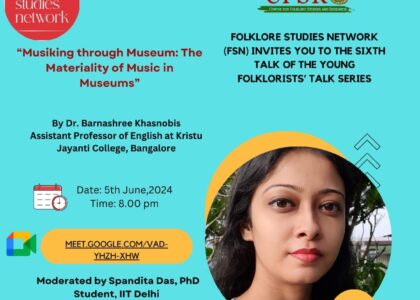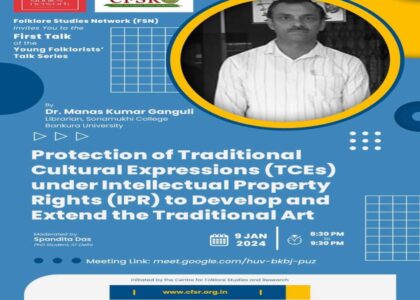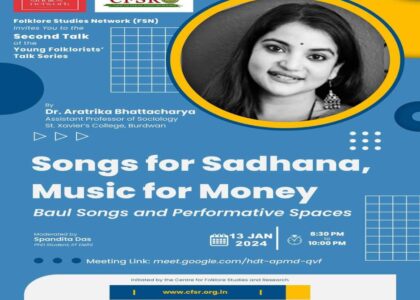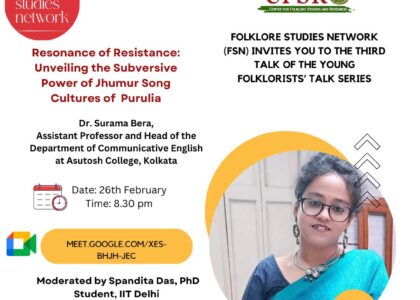Folklore Studies Network Invites you to the Fourth Lecture of the Young Folklorists’ Lecture Series on “Bakhtin, Bhakti, and Beyond: Folkloristic Approaches to South Asian Religion” By Dr. Nimeshika Venkatesan, Asst. Professor at Dept. of English at Sri Sivasubramaniya Nadar College of Engineering.
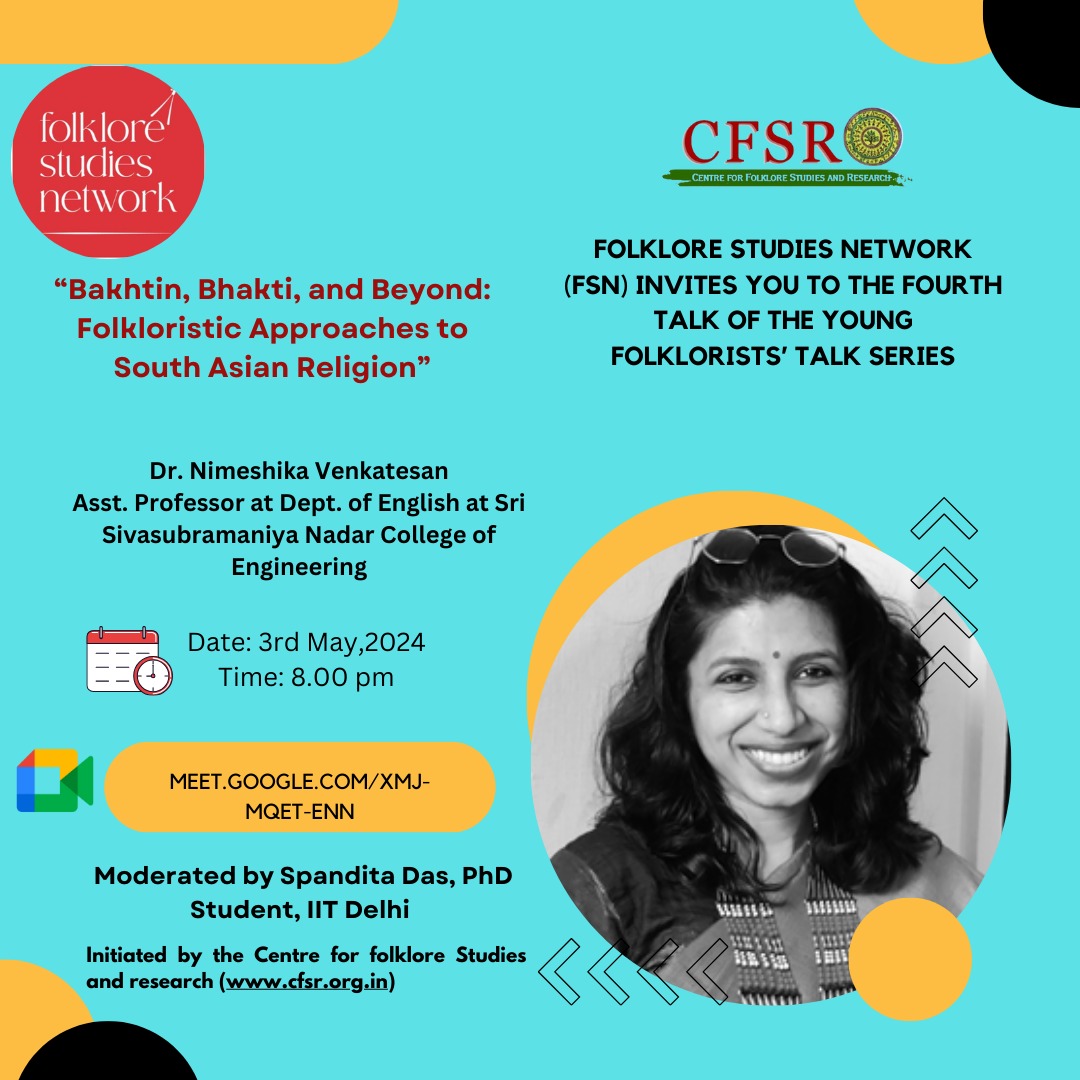
Bakhtin, Bhakti and Beyond: Folkloristic Approaches to South Asian Religion
Abstract
The three key points to this talk namely Bhakti, Bhaktin and Beyond alludes to my attempt at interdisciplinary engagements within the said domains. Firstly the notion of bhakti would be examined in congruence with the notion of vernacular religion; Secondly by deriving inspiration from the critical conceptions of russian scholar Mikhail Bakhtin this talk throw light on what I refer to as Dialogic Vernacular Expressivity, a narratological reading framework built on Mikhail Bakhtin’s compendium of notions some of which namely the notions of utterance “ speech genre”, “novelisation” and most importantly “dialogism”. Thirdly through a genre oriented narratological study I propose the “Hagiographic Folk Motif ” Inspired by Stith Thompson, Anti Aarne classification of the folk motif index, the Hagiographic folk motif charts patterns seen in the lives of the Saint Protagonists as seen narrated in the fictionalized biographies of saints. Finally Beyond indicates the need to transcend texts and explore deeply the narrative fabric exploring South Asian storytelling genres and their manifestations reflected in the narratives of the saints. Thus it is essential to expand the scope of the methodological frameworks between the study of religion and folkloristics to understand the complex multi-layered nature of religion, belief and practice in everyday life. Therefore in this spirit this lecture is intended to be a dialogue between the disciplinary domains of religious studies, folkloristics and literary criticism i.e. between Bhakti, Bakhtin and Beyond.
Bionote: An aspiring theorist and nascent folklorist Dr. Nimeshika Venkatesan is currently employed as an Assistant Professor at the Department of English, Humanities and Social Sciences, Sri Sivasubramaniya Nadar College of Engineering, Chennai. Her research interests pertain to inter-disciplinary and transdisciplinary approaches to studying south Asian religion notably bhakti literature, bolstering innovative theoretical approaches to study the representation, expression and exhibition of religious practice and performance using folkloristics reading methods.
She is affiliated to several organizations such as the International Society for Folk Narrative Research, Society of Ethnology and Folkloristics and Pilgrimage Studies Network to name a few. Her research interest pertains to exploring the intersections between religion, folklore, and popular Culture. In recent times she has been exploring ways to promulgate interdisciplinary approaches to studying aspects of folk cultures and South Asian storytelling genres in conjunction with religious practice, beliefs and traditions Post her Ph. D thesis, her intent is to work towards contributing actively towards studies in folkloristic phenomena exploring vis à vis intersection within other disciplinary domains.
She is the Co-host of the What the Folk Podcast alongside Dr. Kikee Doma Bhutia where they explore different terms in folklore in every episode as an attempt to make academia accessible.
Date: 3rd May, 2024 – Time: 8 p.m. – 9 p.m.
Google Meeting Link: meet.google.com/xmj-mqet-enn
Report:
Dr. Nimeshika Venkatesan who teaches English at Sri Sivasubramaniam College of Engineering in Chennai delivered the fourth talk of the Young Folklorists’ Lecture Series. Titled as “Bakhtin, Bhakti, and Beyond: Folkloristic Approaches to South Asian Religions”, her presentation proposed a novel and ambitious method of analyzing South Asian texts and films by uncovering the way expressions and articulations of oral narratives feed into the same extensively. The theoretical underpinning of this proposed method came from Mikhail Bakhtin’s notions of dialogism and speech genres that offered the speaker a means to theorize vernacular religious articulations. By underlining select motifs employed in the film Allama (2017) directed by T. S. Nagabharana, Dr. Venkatesan demonstrated how several speech genres characteristic of everyday lives of South India seamlessly interweave the fictionalized biography of Allama Prabhu, the famous Kannada Vachana poet who propounded the Virasaiva movement. The talk thus theorized the relationship between hagiography and contemporary fictional literary as well as visual genres and oral traditions in a bottom-up model whereby folk expressions have found their way into and got crystallized in standard written and fictionalized narratives. The transdisciplinary scope of the talk invited a range of questions and comments from the listeners who joined from different parts of the country.
.
Lorem ipsum dolor sit amet, consectetur adipiscing elit. Ut elit tellus, luctus nec ullamcorper mattis, pulvinar dapibus leo.

